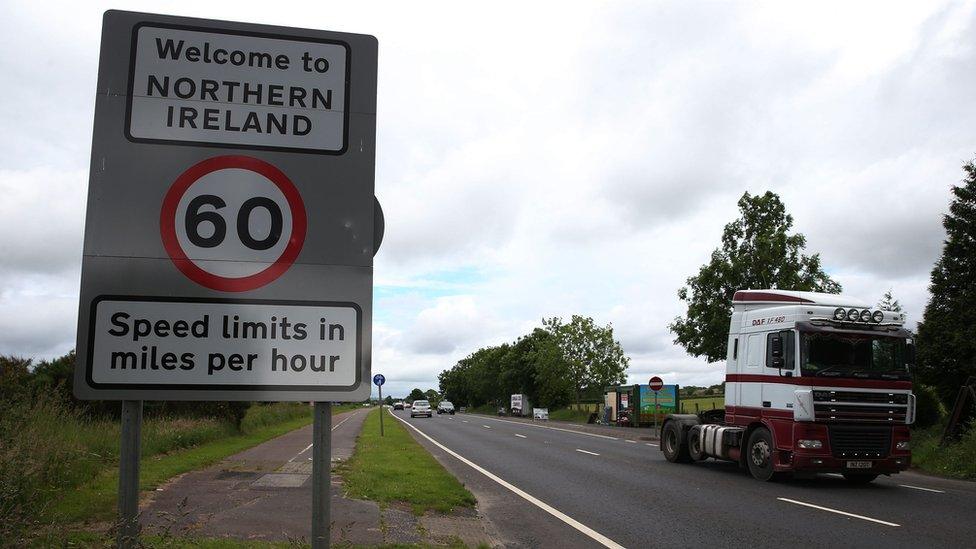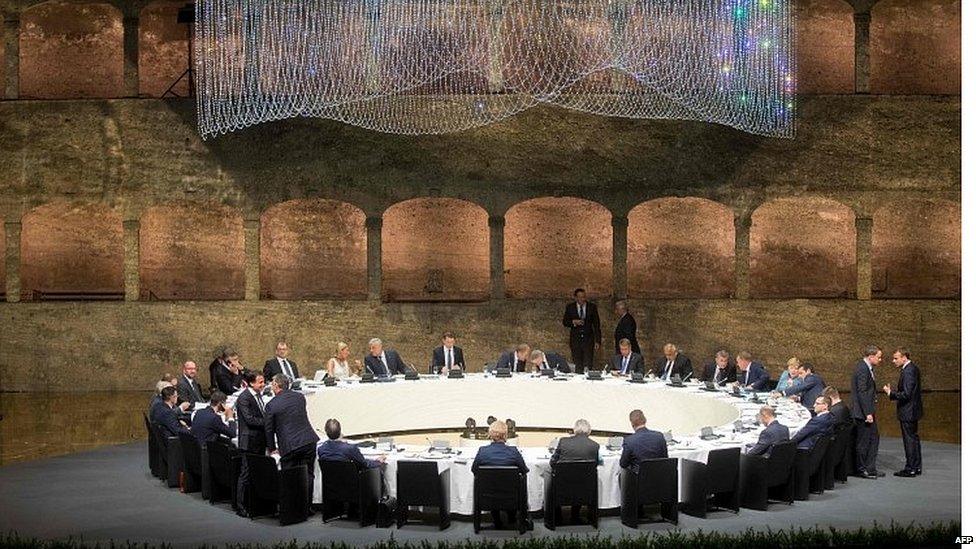Brexit: Theresa May tells EU leaders their plans must 'evolve'
- Published
- comments
Theresa May on what can be achieved at Salzburg summit
Theresa May has said the EU must "evolve" its stance on the Irish border as she seeks to persuade fellow leaders about the viability of her Brexit plan.
The PM is using a dinner in Salzburg to make the case for her controversial Chequers strategy for future relations.
Before the event, she said it was the only credible plan to allay concerns on the Irish border and trade disruption.
Austrian chancellor Sebastian Kurz, who is hosting the event, said both sides needed to make compromises.
The UK and EU both want to avoid a hard border - meaning any physical infrastructure like cameras or guard posts - between Northern Ireland and the Republic of Ireland but can't agree on how.
Mrs May has previously rejected the EU's "backstop" plan - which involves keeping Northern Ireland aligned with its trading rules - saying it would divide up the UK.
Ahead of the Salzburg summit, the EU's negotiator Michel Barnier said most checks could take place away from border areas, an apparent concession to the UK.
Addressing reporters as she arrived for dinner in the Austrian city, Mrs May welcomed what she said was the EU's recognition its initial proposal were "unacceptable".
"If we're going to achieve a successful conclusion then, just as the UK has evolved its position, the EU will need to evolve its position too," she said.
Why is the Irish border an issue?
BBC News NI's political reporter Jayne McCormack explains why the border is an issue
After Brexit, the 310 mile border between Northern Ireland and the Republic of Ireland will become the UK's border with the EU.
At the moment, thousands of people cross it every day for both work and pleasure - as do goods, like food and medicines, being delivered across the two countries.
As part of the EU single market and customs union, these products do not need to be checked for customs and standards, but when the UK leaves these two arrangements, this all changes.
Nobody wants a hard border for the checks - in fact the 1998 Good Friday agreement, which helped bring peace to Northern Ireland, got rid of security checks as part of the deal, and police in Northern Ireland have warned reinstating them could make crossings targets for violence.
But there is no agreement between the UK and EU, or between Leavers and Remainers, about the answer.

The border between the two countries has hundreds of crossing points
Privately, EU officials say those checks could be carried out by British or EU officials, or by health inspectors rather than customs officials, to "de-dramatise" the border issue.
Mrs May has insisted there needs to be "friction-free movement of goods", with no customs or regulatory checks, between Northern Ireland and the Republic, in order to avoid a hard border there.
Six months to go
There are just over six months to go before the UK is due to leave the EU on 29 March 2019.
Negotiations are at a critical stage, with both sides hoping for an agreement on the terms of the UK's withdrawal and future trade relations by the start of November at the latest.
Speaking on Tuesday, Mr Barnier said the talks were in the "home straight" but there were still significant areas of disagreement - such as on the role of the European Court of Justice in enforcing the withdrawal agreement and intellectual property issues, including geographical protections for food and drink.
"October is the key point in time - it is the moment of truth," he added.
What is the EU's position on Ireland?
The EU is still insisting on its own "legally operationally backstop" - what it describes as an insurance policy to prevent the return of physical infrastructure on the border in the event no other solution can be found.
Brussels put forward a proposal in February that would see Northern Ireland stay aligned with the EU in key areas, effectively staying in the customs union and single market and not needing those border checks.
But the UK insisted this was unacceptable as it would split Northern Ireland off from the rest of the UK.
On Tuesday Mr Barnier said the backstop should focus on a "set of technical checks and controls" to make sure standards are met and customs are paid, and not be about a sea or land border.
Allow X content?
This article contains content provided by X. We ask for your permission before anything is loaded, as they may be using cookies and other technologies. You may want to read X’s cookie policy, external and privacy policy, external before accepting. To view this content choose ‘accept and continue’.
"We are ready to improve this proposal," he said.
"Work on the EU side is ongoing. We are clarifying which goods arriving in Northern Ireland from the rest of the UK would need to be checked and where, when and by whom these checks could be performed.
"We can also clarify that most checks can take place away from the border at a company premises or at the markets."
BBC Northern Ireland business editor John Campbell said that the fact the EU was prepared to "improve" the language of the backstop was not news as it had been talked about before, external - so "we need to wait and see what any improvements might amount to".
Speaking in Salzburg, Mr Tusk confirmed a special EU summit dedicated to Brexit would take place in mid-November.
He welcomed some elements of the Chequers proposals - on security and policing - but said that on the Irish border and economic cooperation they will need to be "reworked and further negotiated".
The UK response

It has been reported Mrs May will have ten minutes to update her 27 counterparts
At the dinner in Salzburg, Mrs May is expected to appeal for "goodwill and determination" from the EU, while stressing that "no other country" could accept the EU's backstop plan if they were in the same situation.
The UK put forward rival backstop proposals in June, which would see the whole of the UK staying in a customs union with the EU after the end of the proposed Brexit transition period in December 2020.
It also says its Chequers blueprint for a future trading relationship - involving a "common rulebook" for goods and treating the UK and the EU as a "combined customs territory" - would solve the border question.
Brexit Secretary Dominic Raab said the EU had to move closer to the UK's position or it would be a "lose-lose" for both sides.
"Chequers may not be perfect, but it's the most credible plan," he told LBC Radio.
"I think there is an understanding that we're approaching the endpoint of these negotiations, and there will need to be some movement on the EU side."
New referendum 'would destroy trust'
In an interview with the Daily Express, external, Mrs May said that going back on the 2016 vote to leave the EU would "destroy trust in politicians".
MPs had decided to give people a vote on EU membership by a large margin, she said: "People weren't saying it's the choice of the public except if we disagree with the answer we'll ask them again."
The People's Vote campaign wants the final terms of Brexit to be put to a referendum with the option of staying in the EU if it is rejected.
"My answer to the People's Vote is that we've had the people's vote - it was the referendum - and now we should deliver on it," the prime minister said.
On Tuesday People's Vote set out ways they said a new referendum could be achieved through votes in Parliament.
